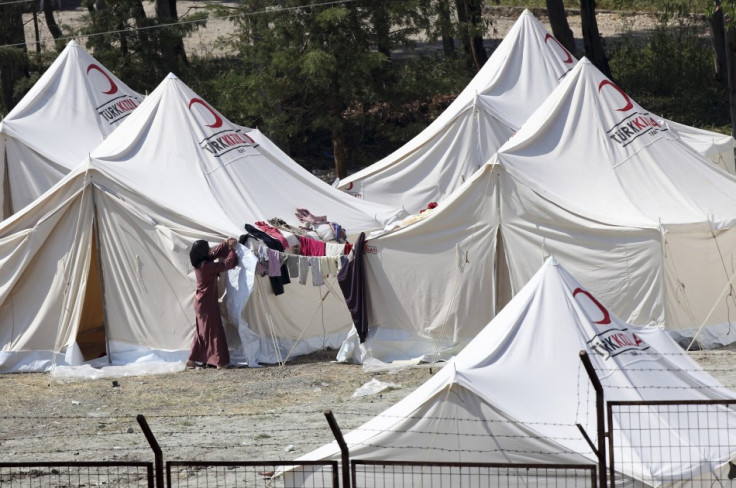Syria Crisis: Turkey opens its door to the Jisr al-Shughour Syrian refugees

Turkish Prime Minister Erdogan has announced that Turkey will not close its doors to Syrians fleeing unrest in their country.
The minister confirmed his country's position after a group of 169 Syrians fled the border town of Jisr al-Shughour overnight, fearing bloodshed.
"We are monitoring developments in Syria with concern," Prime Minister Tayyip Erdoğan said at a news conference, before urging Damascus to "change its attitude toward civilians" and "take its attitude to a more tolerant level as soon as possible."
In an interview on Wednesday, Foreign Minister Ahmet Davutoğlu told the private channel NTV that Turkey had been trying to push for a peaceful transition process, but was now forced to realise that most of the reforms promised by the Assad government had not been implemented.
While Ankara had previously enjoyed good relations with the Syrian regime, in April, Erdoğan sent his envoy to Damascus to urge al-Assad to take steps toward reforms, and said Turkey was willing to guide and advise the regime on the political and economic overhaul. Also, at the beginning of the month, the country welcomed Syrian opposition groups who gathered in the Turkish Mediterranean city of Antalya to discuss a transition process in Syria.
Commenting on the situation the Turkish Minister acknowledged the rise of violence in Syria and confirmed his country is now expecting a massive influx of refugees.
"We have taken all necessary precautions in case of a massive flow of crossings," Davutoğlu said. However, implying that the Turkish authorities are also concerned about possible security threats he suggested that security checks on the refuges would be carried out as he, "We have to determine their intention in seeking refuge."
On Wednesday, after an alleged 120 policemen were killed by armed gangs in the town of Jisr al-Shughour on Monday, inhabitants of the town started to flee as they feared reprisals from the government security forces. Yesterday, a total of 420 Syrians crossed the border and stayed in Turkey, a Turkish Foreign Ministry diplomat told the Daily News.
However by this morning the total amount was raised to 1,000 people, as Syrians continued to cross the border overnight.
Activist organisations were unable to come up with an explanation for the murder of the policemen and different conflicting reports on who were the people who launched the attack on the security forces have surfaced. Some have insisted that the killings had been carried out by dissenters within the armed forces, others were talking about a mutiny, while finally, the last version is that people in the region had started taking up arms to fight against Assad forces who they say have become out of control.
Meanwhile, after the assault, the Syrian Information Ministry Spokeswoman Reem Haddad told the BBC that:
"This afternoon [Monday] about 40 security officers were ambushed in Jisr al-Shughour by armed groups. And not only that, five tonnes of dynamite were stolen. Now altogether that brings the deaths in Jisr al-Shughour to 120 people in these two days. What [security forces] have been actively trying to do is trying to stop these armed groups from harming the citizens."
The latest violent clashes come as the UK and France proposed a UN resolution condemning Syria's suppression of protests.
The draft UN resolution was submitted by Britain and France with the support of Germany and Portugal. The countries say it condemns the systematic violation of human rights in Syria and demands an immediate end to violence and access for humanitarian workers.
They also emphasised that the document stresses that the only solution to the crisis is through an inclusive and Syrian-led process.
However, even if the draft does not authorise any concrete actions or intervention, as Russia has previously clearly stated it was against the Syrian situation being raised in the UN Security Council, the document might not even be put to vote.
The situation has caused a divide the international community. While France and the UK have joined forces, Russia and China did not favour the draft, while India is also still not convinced. It seems that the wind of unrest in North Africa and the Middle East has caused more than one rift as it is the second time that Russia and China oppose the West. While France, Italy and the UK and the US pushed for a Nato intervention in Libya, China and Russia publicly opposed the move even if they did not veto the 1973 resolution. And while Nato has since then raised his bombing campaign on Tripoli, Russia and China have pushed for a political solution. There is therefore a risk for the two rising economies now taking a stronger stand on Syria.
It seems that the Arab world is also divided over whether or not actions should be taken against Syria. While the Assad regime appears to be more and more ostracised after Lebanon closed its frontier last Sunday, and Iran did not actively encourage the Syrian protests at the border with Israel, Turkey also seems to have grown tired of the Assad regime promising for reforms but never really implementing them. Many neighbouring countries also fear that the fall of the Syrian regime could deeply destabilise the country, which could in turn easily spread within the region. On the other hand, a western intervention would not be good news for many of the Arab countries either, as it would risk further increasing tensions and suspicions in an already troubled area.
© Copyright IBTimes 2025. All rights reserved.





















